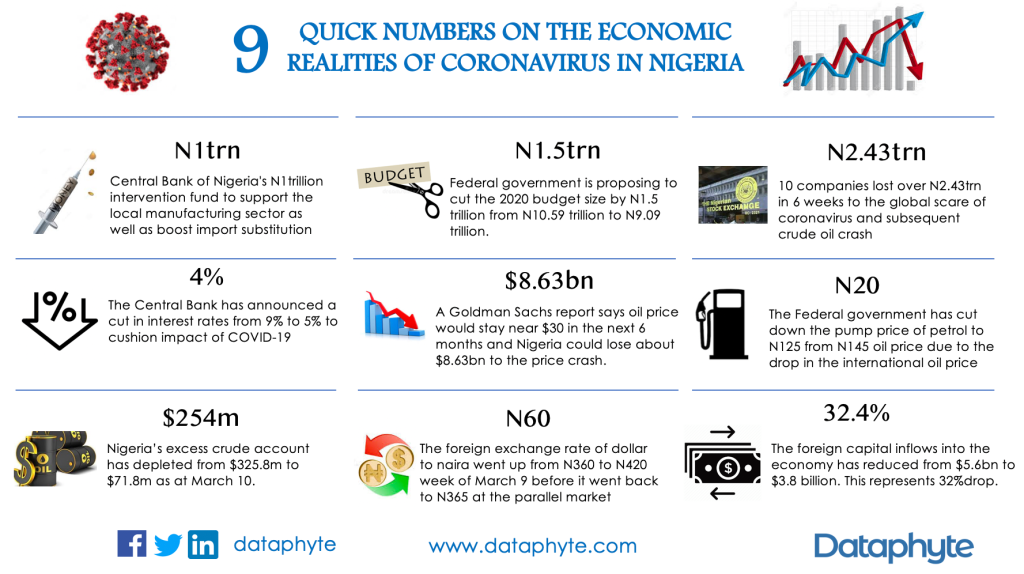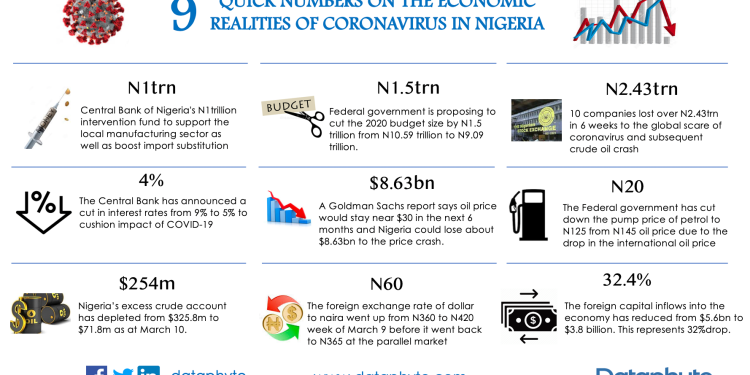As Coronavirus pandemic ravages the health of Nigerian, the fever is crushing the Nigerian economy even more. The coronavirus has a tendency of slow and gradual destruction. It starts with the stage of infection where even the victim is not aware of its presence. Then after a couple of days, it gradually finds its way to the lungs, its object of destruction. At this stage, the person starts showing signs of its presence. Then slowly it eats into the lungs causing great damages which may result in the death of its victim.
The Covid-19 is gradually eating into the lungs of the Nigerian economy and its symptoms are becoming visible. The government has incurred $335.7 million in revenue lost in just three weeks. Nigeria could lose about $8.63 billion to the crude price crash as Goldman Sachs in a report predicted that oil price would stay near $ 30 per barrel in the next six months, amid Saudi Arabia-Russia price war.
The infographics below shows the economic realities of the crisis.
 The loss in revenue has puts its strain on the economy as the government has slashed the 2020 budget by N1.5 trillion which indicates a 14.5% reduction. The Minister of Finance gave the breakdown that this indicates a 20% reduction in capital expenditure as well as a 25% in recurrent expenditure. With the reduction in capital expenditure of which its original 23.3% of the total budget was considered insufficient, it implies that fewer capital projects will be carried out. This will further hinder the pace of development which is already very slow.
The loss in revenue has puts its strain on the economy as the government has slashed the 2020 budget by N1.5 trillion which indicates a 14.5% reduction. The Minister of Finance gave the breakdown that this indicates a 20% reduction in capital expenditure as well as a 25% in recurrent expenditure. With the reduction in capital expenditure of which its original 23.3% of the total budget was considered insufficient, it implies that fewer capital projects will be carried out. This will further hinder the pace of development which is already very slow.
With less money to be generated, the government has indefinitely frozen all employment into government agencies. This implies that the NSCDC, Nigerian Customs Service and all other employment process planned to take effect from this year has been suspended because obviously there is no money to pay additional salaries.
The scary part for Mr Samuel Atiku, an economic analyst is Nigeria’s inability to survive the challenge if it lingers for the predicted period of 12 to 18 months. Mr Atiku cited the 2020 budget being a deficit budget, Federal government recourse to loans and then loans and the alarming dry pocket due to meagre balance in the Excess Crude Account (ECA) and the country reserves.
The Paradox of the Private Sector
The sustainability of an economy lies in the vibrancy of the private sector as a strong complement to the public sector. The monetary policy plans its policy rescue for the public sector around the corporate sector in times of crises. But the dexterity of coronavirus is greatly felt in the private sector. The uncertainties surrounding the naira at local and international markets have reduced foreign capital inflows into the economy by 32.4% to $3.8 billion.
Despite the effort by the Central Bank of Nigeria (CBN) and the parallel market operators, the National Bureau of Statistics report shows that foreign capital inflow experienced a continuous deceleration, driven by post-election uncertainties, falling yields, currency pressures and weakened investors’ confidence.
Hope seems shattered as the foreign capital inflow is expected to continue to experience a successive deterioration. This is due to the already fragile state of Nigeria’s external sector and the havoc wrecked by the Ccvid-19 pandemic. This has to make investor reluctant to hold assets in naira. As they are worried about the value of the naira after oil prices plunged, pushing them to sell down their position on the debt and equity markets.
The international and local news platforms have reported how the pandemonium of COVID-19 is wrecking the global stock markets. At the local front, the Nigeria stock market experienced a more than N2.43 trillion loss in just six weeks. As a global scare caused by the spread of Coronavirus and subsequent crude oil crash fueled major selloffs in the Nigerian equities market.
Analysis shows that market value companies at the stock Nigeria market dropped from N11.71 trillion on February 03, 2020 to close at N9.28 trillion on March 13, representing a drop of N2.43 trillion.
The Frantic Effort by the Government
The Nigerian government in an effort to address the prevailing situation took some steps to curb the economic shock of the coronavirus. She started with the reduction of the pump price of Premium Motor Spirit (PMS) by N20 from N145 to N125 per litre. This was in an effort to bring prices of items down in the midst of little money in circulation.
The CBN announced the injection of N1 trillion into the economy to boost economic activities that are experiencing the negative effect. This is to boost small-medium enterprises and other supporting ventures. Furthermore, the injected fund is to support the manufacturing sector and boost importation substitution.
To encourage borrowing, the CBN has reduced the interest rate from 9% to 5% representing a 55.6% reduction in the rates. This is to increase borrowing and the possible investment with the objective of cushioning the effect of Covid-19 on the economy.
The Covid-19 has obviously exposed the fragility of the Nigerian economy and its inability to survive crises. The coronavirus tides, only blow a wind of reflection for the leadership to secure pragmatic policies that would withstand global crises. For Nigeria has been blown too many times in its sixty years since independence.



